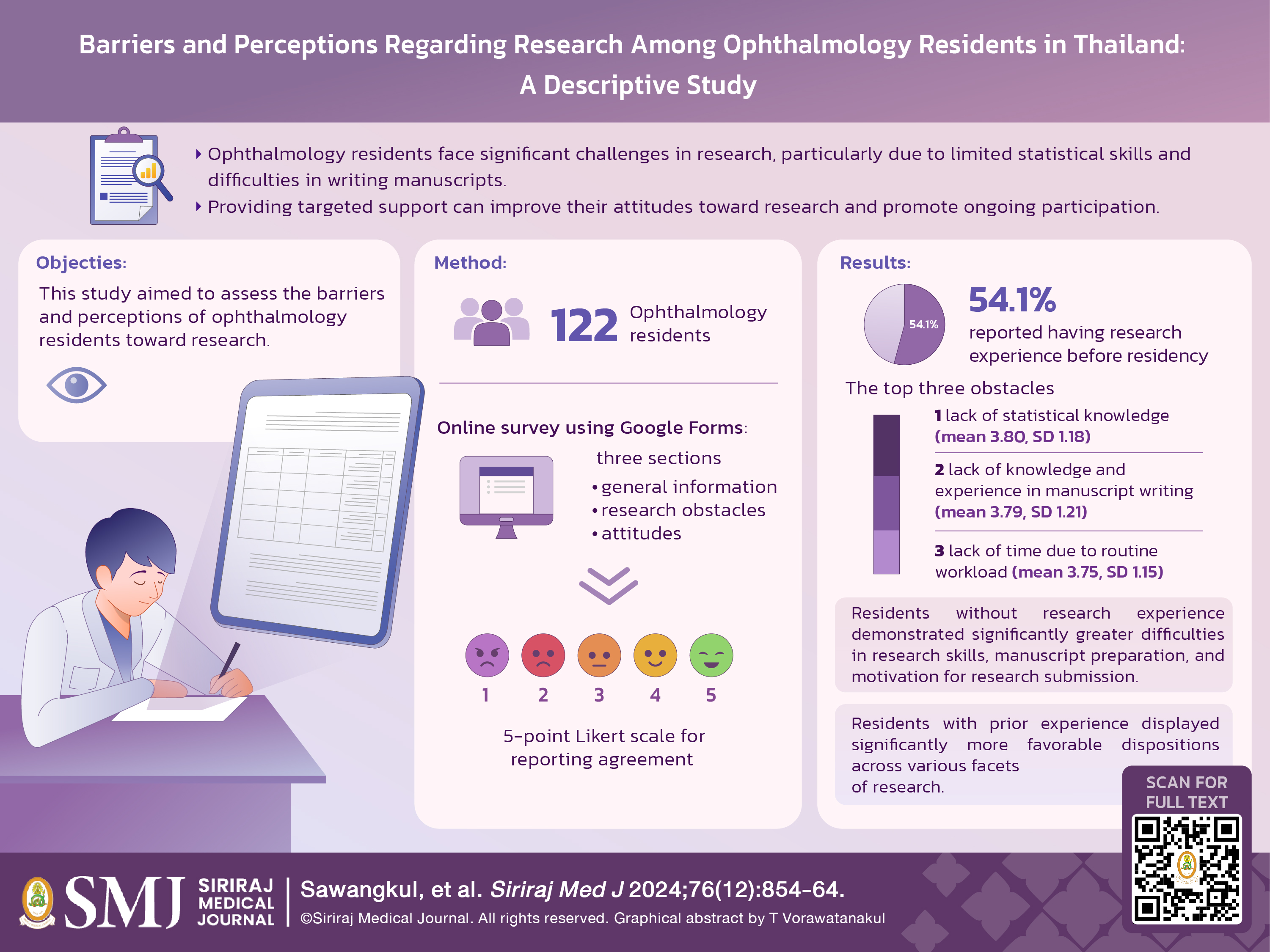Barriers and Perceptions Regarding Research Among Ophthalmology Residents in Thailand: A Descriptive Study
DOI:
https://doi.org/10.33192/smj.v76i12.270324Keywords:
Attitudes, Obstacles, Ophthalmology, Research, Residency trainingAbstract
Objective: This study aimed to assess the barriers and perceptions of ophthalmology residents toward research and to discern the differences between residents with and without prior research experience before commencing
ophthalmology training.
Materials and Methods: An online survey using Google Forms was conducted to collect data. The survey comprised three sections: general information, research obstacles, and attitudes. Participants utilized a 5-point Likert scale for reporting agreement.
Results: The survey was completed by 122 ophthalmology residents, representing a 51.3% response rate. Among them, 54.1% reported having research experience before residency. The top three obstacles identified were “lack of statistical knowledge” (mean 3.80, standard deviation 1.18), “lack of knowledge and experience in manuscript writing” (mean 3.79, SD 1.21), and “lack of time due to routine workload” (mean 3.75, SD 1.15). Residents without research experience demonstrated significantly greater difficulties in research skills, manuscript preparation, and motivation for research submission. While overall research attitudes were positive (mean 3.20, SD 1.18), residents with prior experience displayed significantly more favorable dispositions across various facets of research. These were preferences, perceived educational and career advantages, potential for income generation, and enhancement of communication skills. Conversely, the non-experienced residents primarily viewed research as a graduation requirement.
Conclusion: Ophthalmology residents encountered considerable challenges in conducting research, primarily stemming from limited statistical knowledge and inadequate competency in manuscript writing. Implementing
targeted support measures to address these barriers can foster positive research attitudes and encourage sustained research engagement among residents.
References
The Royal College of Ophthalmologists of Thailand. Curriculum prospectus of the diploma of the Thai Board of Ophthalmology (revised curriculum B.E. 2560) [Internet]. 2017. Available from: http://www.rcopt.org/index.php?r=arart010/detail&id=1998.
Habineza H, Nsanzabaganwa C, Nyirimanzi N, Umuhoza C, Cartledge K, Conard C, et al. Perceived attitudes of the importance and barriers to research amongst Rwandan interns and pediatric residents - a cross-sectional study. BMC Med Educ. 2019;19(1):4.
Al-Taha M, Al Youha S, Al-halabi B, Stone J, Retrouvey H, Samargandi O, et al. Barriers and Attitudes to Research Among Residents in Plastic and Reconstructive Surgery: A National Multicenter Cross-Sectional Study. J Surg Educ. 2017;74(6):1094-104.
Ting DSJ, Vrahimi M, Varma D, Steel DHW. Research attitudes and perceived barriers to conducting research among ophthalmology trainees. Eye (Lond). 2018;32(3):653-5.
Jaroonvanichkul V, Deerojanawong J. Residents' Obstacles and Attitudes Toward Research during Residency Training. J Med Assoc Thai. 2016;99(2):239-44.
Komonhirun R. Obstacles and Needs of Anesthesia Residents towards Research Supporting System in the Faculty of Medicine Ramathibodi Hospital, Mahidol University. Thai J Anesthesiol. 2021;47(4):287-92.
Mitwalli HA, Al Ghamdi KM, Moussa NA. Perceptions, attitudes, and practices towards research among resident physicians in training in Saudi Arabia. East Mediterr Health J. 2014;20(2):99-104.
Kumsang Y, Atsawasena W, Jaovisidha S, Khowkham P, Tohsumlee S, Keatjidaro O, et al. The Factors Affecting Residents and fellows' Research Conduct in Department of Diagnostic and Therapeutic Radiology, Faculty of Medicine, Ramathibodi Hospital, Mahidol University. Rama Med J. 2012;35(1):48-53.
Likert R. A technique for the measurement of attitudes. Arch Psychol. 1932;22(140):55.
Pimentel JL. A note on the usage of Likert Scaling for research data analysis. USM R&D. 2010;18:109-12.
Sabzwari S, Kauser S, Khuwaja AK. Experiences, attitudes and barriers towards research amongst junior faculty of Pakistani medical universities. BMC Med Educ. 2009;9:68.
Gill S, Levin A, Djurdjev O, Yoshida EM. Obstacles to residents' conducting research and predictors of publication. Acad Med. 2001;76(5):477.
Levine RB, Hebert RS, Wright SM. Resident research and scholarly activity in internal medicine residency training programs. J Gen Intern Med. 2005;20(2):155-9.
Memarpour M, Fard AP, Ghasemi R. Evaluation of attitude to, knowledge of and barriers toward research among medical science students. Asia Pac Fam Med. 2015;14(1):1.
Silcox LC, Ashbury TL, VanDenKerkhof EG, Milne B. Residents' and program directors' attitudes toward research during anesthesiology training: a Canadian perspective. Anesth Analg. 2006;102(3):859-64.
Babu M, Shaik S, HU B. Researching the research: Ophthalmology residents’ perspective. Journal of Medical Education Development. 2023;15(48):30-7.
Al Saeed AA, AlEnezi SH, Aljindan M, Alwadani F, Al Owaifeer AM. Experience, Attitude, and Perceived Barriers Toward Research Among Ophthalmology Residents in Saudi Arabia: A National Cross-Sectional Study. Clin Ophthalmol. 2022;16:265-72.
Ballard TN, Sando IC, Kasten SJ, Cederna PS. Successfully Integrating Research into Plastic Surgery Training Programs. J Craniofac Surg. 2015;26(8):2279-82.
Fisher WR. Medical student research: a program of self-education. J Med Educ. 1981;56(11):904-8.
Park SJ, McGhee CN, Sherwin T. Medical students' attitudes towards research and a career in research: an Auckland, New Zealand study. N Z Med J. 2010;123(1323):34-42.
Jayasundera T, Fisk M, McGhee CN. Attitudes to research and research training among ophthalmologists and ophthalmology trainees in New Zealand. Clin Experiment Ophthalmol. 2003;31(4):294-9.

Published
How to Cite
License
Copyright (c) 2024 Siriraj Medical Journal

This work is licensed under a Creative Commons Attribution-NonCommercial-NoDerivatives 4.0 International License.
Authors who publish with this journal agree to the following conditions:
Copyright Transfer
In submitting a manuscript, the authors acknowledge that the work will become the copyrighted property of Siriraj Medical Journal upon publication.
License
Articles are licensed under a Creative Commons Attribution-NonCommercial-NoDerivatives 4.0 International License (CC BY-NC-ND 4.0). This license allows for the sharing of the work for non-commercial purposes with proper attribution to the authors and the journal. However, it does not permit modifications or the creation of derivative works.
Sharing and Access
Authors are encouraged to share their article on their personal or institutional websites and through other non-commercial platforms. Doing so can increase readership and citations.














